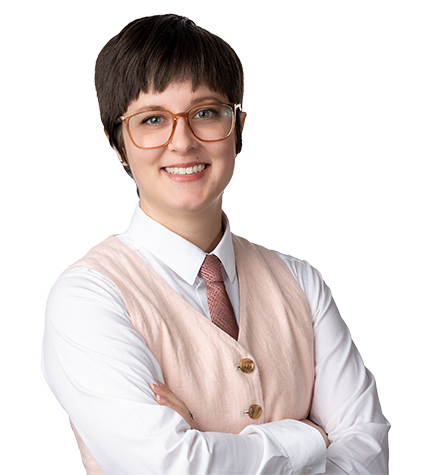Taylor Hatridge is an associate in the Litigation group. She earned her J.D. from the University of Wisconsin Law School, where she served as a note and comment editor of the Wisconsin Law Review and participated in the Giles Sutherland Rich Memorial Moot Court competition.
Taylor earned her M.S. in Chemical and Biomolecular Engineering from Georgia Institute of Technology. There, she was awarded the National Science Foundation Graduate Research Fellowship and served as president of the Association of Chemical Engineering Graduate Students and co-chair of the Graduate Student Recruitment Committee. Taylor’s graduate research and writing focused on engineering efficient processes to synthesize complex biologically active molecules.
Taylor graduated from the University of Texas at Austin with a B.S. in Chemical Engineering, where she worked as a research assistant in labs studying protein engineering and polymer chemistry.
News
Publications
-
“The State of USPTO Rulemaking at the End of Vidal’s Term,” Law360 (December 16, 2024)
- “Begging the Question: Judicial Review of Ballot Questions for Referred State Constitutional Amendments in Wisconsin,” Wisconsin Law Review (2023)
- “Synthesis of Poly (allyl glycidyl ether)-Derived Polyampholytes and Their Application to the Cryopreservation of Living Cells,” Biomacromolecules (2023)
- “Copper-catalyzed, aerobic oxidation of hydrazone in a three-phase packed bed reactor,” Organic Process Research & Development (2021)
- “Copper (II) acetate-induced oxidation of hydrazones to diazo compounds under flow conditions followed by dirhodium-catalyzed enantioselective cyclopropanation reactions,” Organic Letters (2021)
Practice Areas
Education
University of Wisconsin Law School (J.D., 2024); Note and Comment Editor, Wisconsin Law Review; Giles Sutherland Rich Memorial IP Competition, Midwest Region Winner, 2024
Georgia Institute of Technology (M.S., Chemical and Biomolecular Engineering, 2021); National Science Foundation Graduate Research Fellowship
The University of Texas at Austin (B.S., Chemical Engineering, 2017); Undergraduate Research Fellowship
Admissions
- District of Columbia
- Wisconsin



